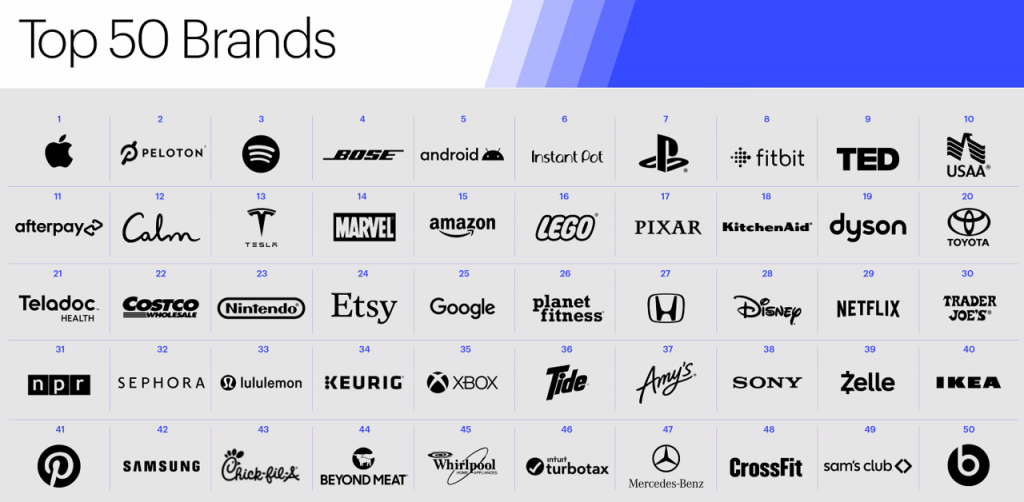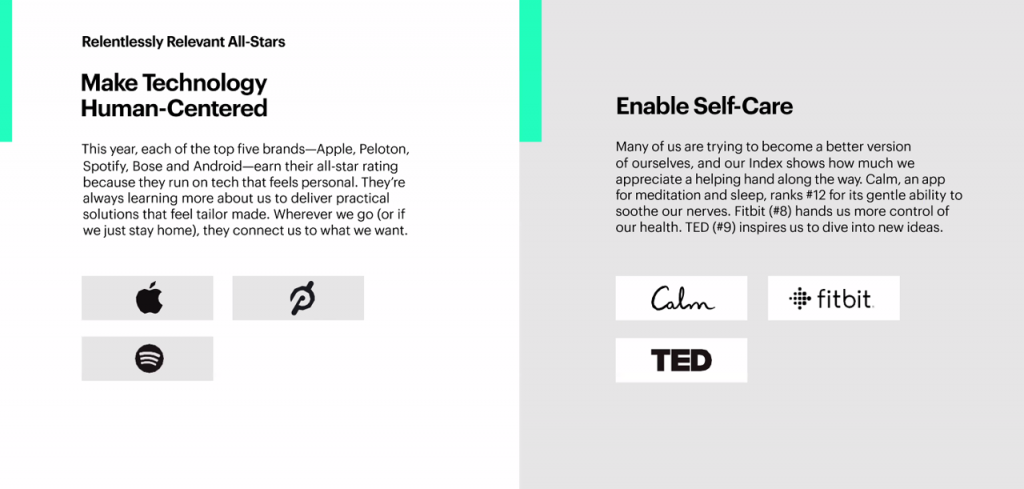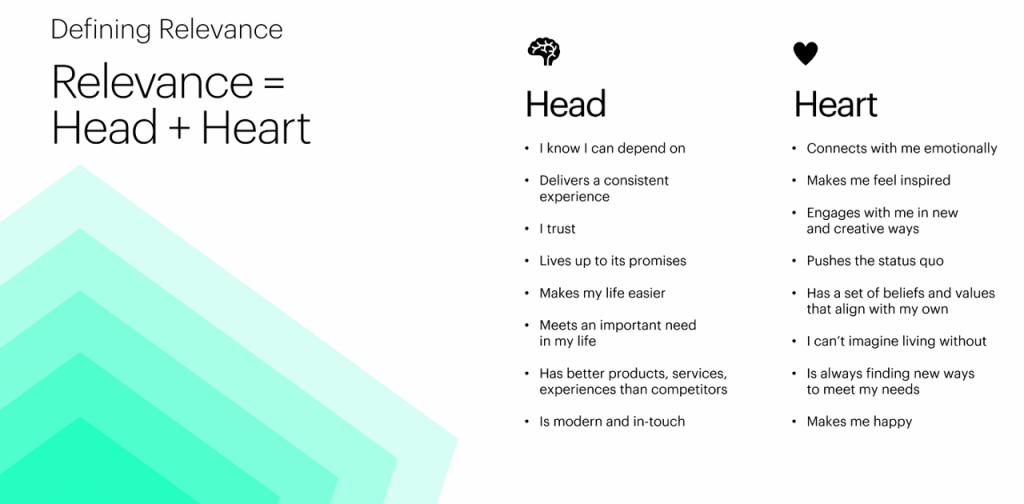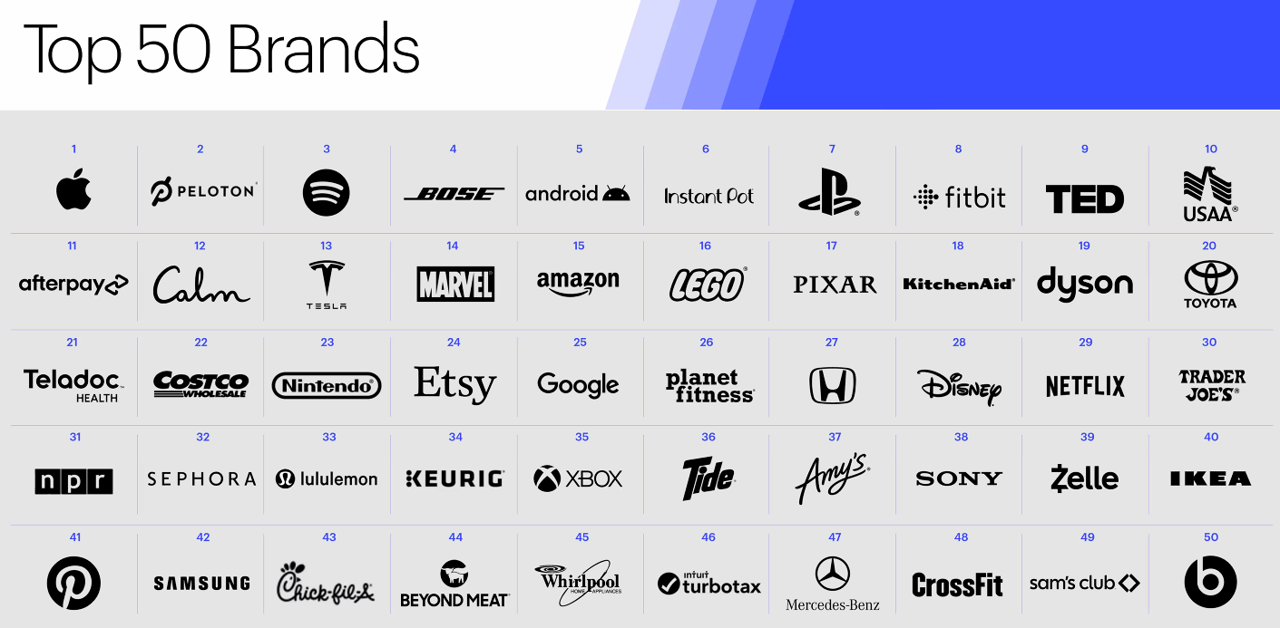s
in the seventh annual 2022 Brand Relevance Index from Prophet.
The research developed a list of 50 companies representing what Prophet characterizes “the brands that people can’t live without in 2022.”
 For the 7th year in a row, Apple tops the study. Following Apple, the nine companies rounding out the top ten most relevant brands were Peloton, Spotify, Bose, Android, Instant Pot, Pixar, Fitbit, TED, and USAA.
For the 7th year in a row, Apple tops the study. Following Apple, the nine companies rounding out the top ten most relevant brands were Peloton, Spotify, Bose, Android, Instant Pot, Pixar, Fitbit, TED, and USAA.
There are relative newbies in this list, representing consumers’ collective response to the COVID-19 pandemic and new life-flows. Put Calm and AfterPay in that category, along with Beyond Meat, and Zelle.
The top 50 has a lot of health, wellness, and self-care baked into the top 50; with my health ecosystem-wide lens, I would point to the following brands that reflect consumers’ growing role in self-care (beyond Goop) and the home as our health hubs: in ranking order among the 5o, consider…
- Apple, for wearable tech for health and other health care programs)
- Peloton, for connected fitness
- Spotify, for health information as well as mis-information
- Android, for connectivity
- Instant Pot, for healthy cooking at home
- Fitbit, for connected health innovation
- TED, for health story inspiration
- USAA, for financial wellness
- Calm, for mental health and wellbeing
- Amazon, for, well, a lot of health care touchpoints from voice tech to epharmacy and Amazon Care virtual care
- LEGO, for mental wellbeing (in my and many other households)
- KitchenAid, for healthy cooking
- Dyson, for home hygiene
- Teladoc, for virtual care and chronic care management
- Costco, for sourcing vitamins and health goods
- Google, for “Paging Dr. Google” healthcare research and connectivity
- Planet Fitness, for, well, fitness and wellbeing
- NPR, for information links
- Sephora, for self-care
- Lululemon, for athleisure and exercise (THINK: Mirror, the connected fitness company Lululemon acquired in 2020)
- Tide, for home hygiene
- Ikea, for sustainable home goods
- Samsung, for connected home and living
- Beyond Meat, for nutrition
- Whirlpool, for home hygiene (and for addressing education, a key social determinants of health — one of my favorite non-healthcare health-ful companies)
- CrossFit, for fitness…
You get my drift here.
 The Prophet team folks do, too.
The Prophet team folks do, too.
See this explanation from the report detailing factors underpinning the “Relentlessly Relevant All-Stars.” I’ve picked “Make Technology Human-Centered” and “Enable Self-Care,” but there are others Prophet identified that enable health and wellness, too.
Here, enchanting and inspiring UX design rules, with Apple, Pinterest, and Spotify “running on tech that feels personal,” Prophet asserts, “delivering practical solutions that feel tailor made.”
That enables more personalized health and wellness.
Then there’s enabling self-care, pointing to Calm, Fitbit, and TED.
Being “brand relevant” isn’t just a nice-to-be adjective for a company to brag about. Relevance means value for investors, Prophet calculates: the S&P 500 comprise the largest publicly-traded companies in the U.S., together worth $17 trillion in value.
However, the most relevant brands in the Prophet analysis represent only 1% of the S&P community but 10% of its value. Another way to consider that value is in terms of growth: over 10 years to 2021, the Prophet most relevant brands grew on average 24% more than the S&P 500.
Prophet polled over 13,000 consumers studying 293 brands in 27 categories. The survey was fielded in October and November 2021, with each consumer rating five brands on 16 attributes.
 Health Populi’s Hot Points; In this year’s Brand Relevance Index, Prophet calls out the importance of head PLUS heart in a new holistic approach.
Health Populi’s Hot Points; In this year’s Brand Relevance Index, Prophet calls out the importance of head PLUS heart in a new holistic approach.
For the consumer’s head, brands enable peoples’ self-reliance and DIY confidence, Prophet notes.
For the consumer’s heart, brands turn people into fans and collectors (like LEGO, Marvel and Disney are so good at doing).
The heart-brands inspire “democratizing the way people create and build.”
Line items on both sides of this head/heart yin and yang ledger are particularly relevant to health care and well-being:
- Meets an important need in my life, for the head
- Is always finding new ways to meet my needs, for the heart.
Together, these two values can serve True North guides for health care innovators that resonate with health consumers in our post-pandemic world.





 Interviewed live on BNN Bloomberg (Canada) on the market for GLP-1 drugs for weight loss and their impact on both the health care system and consumer goods and services -- notably, food, nutrition, retail health, gyms, and other sectors.
Interviewed live on BNN Bloomberg (Canada) on the market for GLP-1 drugs for weight loss and their impact on both the health care system and consumer goods and services -- notably, food, nutrition, retail health, gyms, and other sectors. Thank you, Feedspot, for
Thank you, Feedspot, for  As you may know, I have been splitting work- and living-time between the U.S. and the E.U., most recently living in and working from Brussels. In the month of September 2024, I'll be splitting time between London and other parts of the U.K., and Italy where I'll be working with clients on consumer health, self-care and home care focused on food-as-medicine, digital health, business and scenario planning for the future...
As you may know, I have been splitting work- and living-time between the U.S. and the E.U., most recently living in and working from Brussels. In the month of September 2024, I'll be splitting time between London and other parts of the U.K., and Italy where I'll be working with clients on consumer health, self-care and home care focused on food-as-medicine, digital health, business and scenario planning for the future...